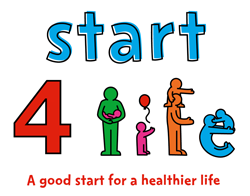Many parents are unaware of the serious health implications of children being overweight (or obese), with a greater risk of long-term health problems, including cardiovascular problems, type 2 diabetes, raised blood pressure, cholesterol, early puberty, asthma and other respiratory problems. Overweight babies and toddlers are more than five times as likely to be overweight as children and adults. Good eating and exercise habits need to be developed early in life. Talk to your health visitor about healthy meal ideas for all the family.
Being overweight is rarely to do with a medical problem, and is simply due to an unhealthy diet and not enough exercise. It is better to prevent your child becoming overweight in the first place. Good sleep patterns, a healthy varied diet and regular exercise will all help keep your child to a healthy weight.
The emotional consequences of obesity in childhood can be severe and long-lasting, including bullying and low self-esteem. Parents can find it difficult to talk to their child about being overweight as they feel guilty and they do not want to upset them by talking about it. Parents often underestimate the amount of food children eat and overestimate the amount of activity they do. Many parents believe their children are already active enough, confusing being boisterous with being active.
Be in control
It can be easy for busy parents (or family members) to prioritise their children’s immediate happiness over their long-term health by giving them the chocolate bar or sugary drink they are crying for. Many parents allow children to decide what goes into the supermarket trolley in order to avoid rows.
You are responsible for what your child eats. What your child eats now will set a pattern for life and overweight children are being set up for a lifetime of sickness and health problems.
Source: www.dh.gov.uk/obesity
Salt and sugar is added to nearly all processed products. Three-quarters of the salt and sugar we eat is already in the food, the rest is what we add to cooking or shake on our meals. Children need less than 5g of salt a day (2g sodium).
 |
Juice drink
25g sugar per 100ml
(6 teaspoons)
|
 |
Pizza slice
2.8g salt |
 |
Fromage frais
13g sugar per 100g
(3 teaspoons)
|
Many parents are unaware of the dangers of childhood obesity, but by following the top tips below you can make a difference to your child’s health.
-
Sugar swaps - swapping sugary snacks and drinks for ones that are lower in sugar can make a huge difference.
-
Meal time - it’s important for kids to have regular, proper meals as growing bodies respond better to routine.
-
Snack check - many snacks are full of the things that are bad for us - sugar, salt, fat and calories. So try and keep a careful eye on how many the kids are having.
-
Me size meals - it’s important to make sure kids get just the right amount for their age.
-
5 a day - five portions of fruit and/or vegetables a day.
-
Cut back fat - too much fat is bad for us. It’s not always easy to tell where it’s lurking.
- Up and about - most of us spend too long sitting down. Keep active. Encourage your child to walk, you may need to use child safety reins.

Source: www.nhs.uk/start4life
1
My mum confuses giving her grandson chocolate with being kind to him. She only wants him to be happy, but I am worried.
2
It can be difficult, but try to explain to her why you would prefer him to have healthy snacks and that in the long run, it is best for him.
3
Give her some healthy meal ideas and maybe send him along with some fruit or vegetable slices to snack on.






